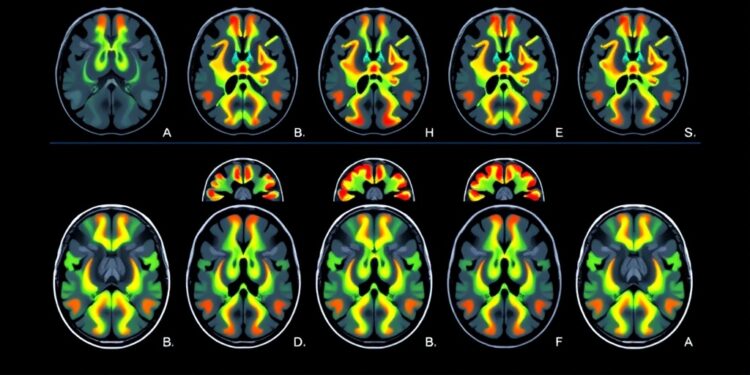
In a groundbreaking study published in the Journal of Clinical Oncology, researchers are making strides in improving the evaluation of brain tumor responses in patients with melanoma receiving immunotherapy. Led by Raymond Y. Huang, MD, Ph.D., of Brigham and Women’s Hospital, the study is a meticulous examination of how different imaging criteria can significantly affect the assessment of treatment efficacy. The research has far-reaching implications, particularly for enhancing the accuracy of clinical assessments of brain metastases linked to melanoma, a form of skin cancer known for its ability to spread aggressively.
The study specifically analyzed the imaging response for patients involved in a multi-center phase 2 clinical trial that investigated the effects of a combination therapy involving two immune checkpoint inhibitors: Nivolumab and Ipilimumab. These medications have gained prominence in recent years due to their ability to modulate the immune system to fight cancer more effectively. However, despite their success, one critical challenge remains—the need for standardized measurement techniques to evaluate treatment outcomes.
Over the course of the study, which spanned over two years, researchers examined a variety of imaging methodologies focusing on MRI scans to assess the status of brain metastases. These measurements are crucial because they help oncologists determine how well a patient is responding to therapy, ultimately guiding treatment decisions that can have substantial implications on patient survival rates. The study meticulously tracked progression-free survival (PFS) and overall survival (OS) while seeking which imaging criteria provided the most reliable forecasts of these outcomes.
The researchers identified that two specific approaches—modified Response Evaluation Criteria in Solid Tumors (mRECIST) and volumetric measurements—showed significant promise in predicting survival with greater accuracy. The mRECIST approach is an evolution of traditional assessment methods that helps quantify tumor response more effectively, while volumetric measurements provide a three-dimensional analysis of tumor size changes. These techniques stood out as particularly beneficial for even small tumors, thereby underscoring their potential utility in clinical trials going forward.
What sets this study apart is not merely its findings, but the essential message about improving consistency in imaging techniques across clinical trials. Inconsistent evaluation criteria have historically complicated the interpretation of data from different studies and limited our understanding of treatment effectiveness. By establishing a more reliable standard for assessing brain metastases, the findings can streamline future research efforts, enhancing the potential for successful outcomes in clinical settings.
While the study provides encouraging evidence urging the adoption of these advanced imaging techniques, Huang emphasizes that further refinement and validation are still needed. The research team is actively engaged in developing automated segmentation technology aimed at improving the accuracy and consistency of tumor size measurements in MRI scans. This advancement could revolutionize how brain metastases are evaluated, leading to more standardized practices universally adopted across different healthcare institutions.
The widespread implications of this research resonate deeply within the oncology community. By presenting more precise methods for assessing responses to treatment, the study not only advances the field of neuro-oncology but also offers hope for patients facing daunting prognoses associated with brain metastases. Improved evaluation criteria could ultimately lead to more personalized treatment plans and better overall survival rates, a key aspiration for oncologists worldwide.
Furthermore, with the support of significant funding from Bristol Myers Squibb and the National Cancer Institute, this research exemplifies the critical collaboration between academia and industry aimed at addressing pressing clinical challenges. The synergy between researchers and pharmaceutical developers can accelerate innovation in cancer treatment methodologies and improve patient outcomes across the board.
In summary, the work spearheaded by Huang and his colleagues marks a significant milestone in the realm of cancer treatment. By enhancing the methodologies used to evaluate brain metastases in melanoma patients, researchers pave the way for a more effective and consistent approach in clinical trials, ultimately guiding oncologists on the path toward improved treatment strategies. As further enhancements and validations emerge, the oncology field can eagerly anticipate a future where patients benefit from optimized care based on verifiable and rigorous imaging assessments.
The upcoming phase of this research will be crucial, as it aims not only to refine these imaging techniques but also to implement them in clinical practice. Ensuring early and accurate assessment of treatment response will empower oncologists to make informed decisions about transitioning a patient’s therapy, a pivotal step toward increasing overall survival rates in one of the toughest battles against cancer.
As the oncology community continues to grapple with the complexities of brain metastases, the insights gained from this study will be indispensable. Researchers, oncologists, and patients alike can look forward to a future where cancer therapies are evaluated with unmatched precision, illuminating the path towards better health outcomes and perhaps changing the course of how treatments are designed and administered.
Subject of Research: People with melanoma brain metastases treated with immunotherapy.
Article Title: Comparative Analysis of Intracranial Response Assessment Criteria in Patients With Melanoma Brain Metastases Treated With Combination Nivolumab + Ipilimumab in CheckMate 204.
News Publication Date: 3-Jan-2025.
Web References: N/A.
References: Huang R et al. “Comparative Analysis of Intracranial Response Assessment Criteria in Patients With Melanoma Brain Metastases Treated With Combination Nivolumab + Ipilimumab in CheckMate 204.” Journal of Clinical Oncology DOI: 10.1200/JCO.24.00953.
Image Credits: N/A.
Keywords: Neuroscience, Neuroimaging, Cancer, Metastasis, Brain cancer, Melanoma.





